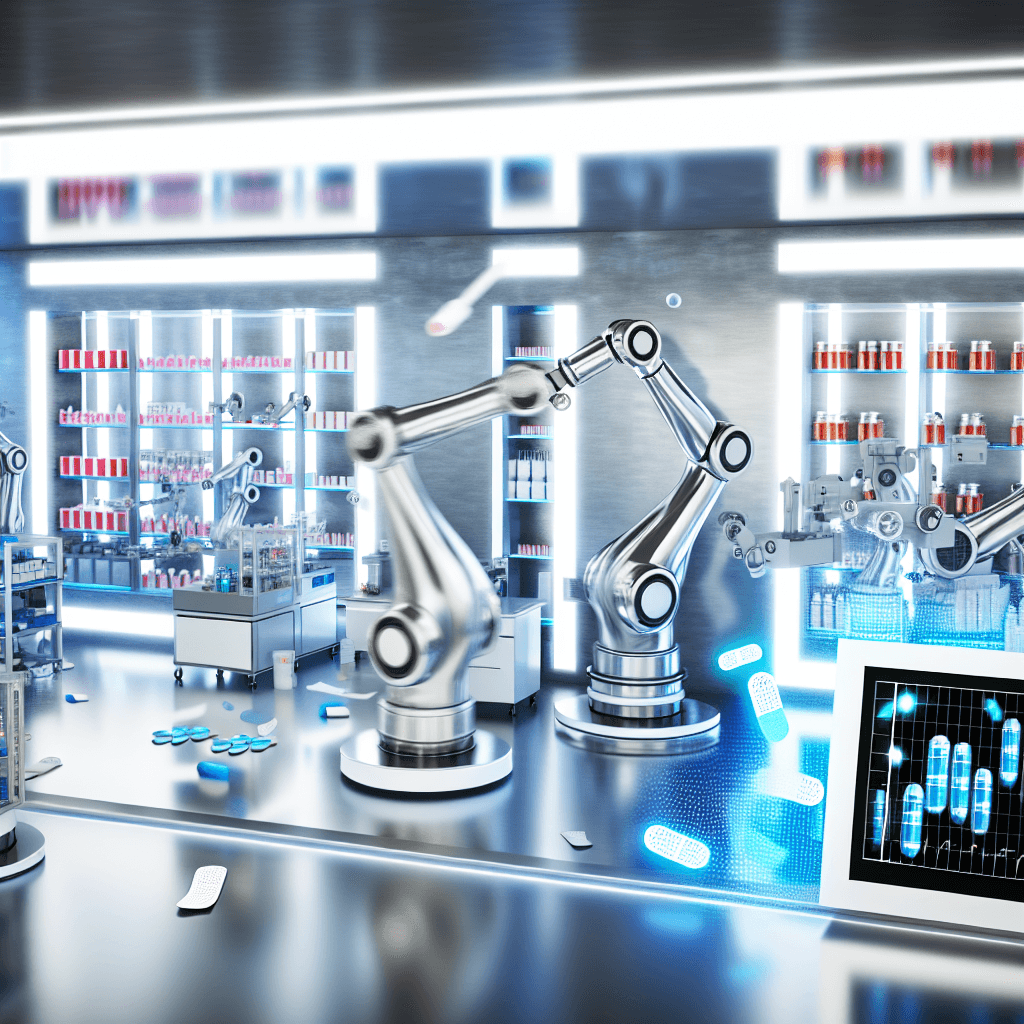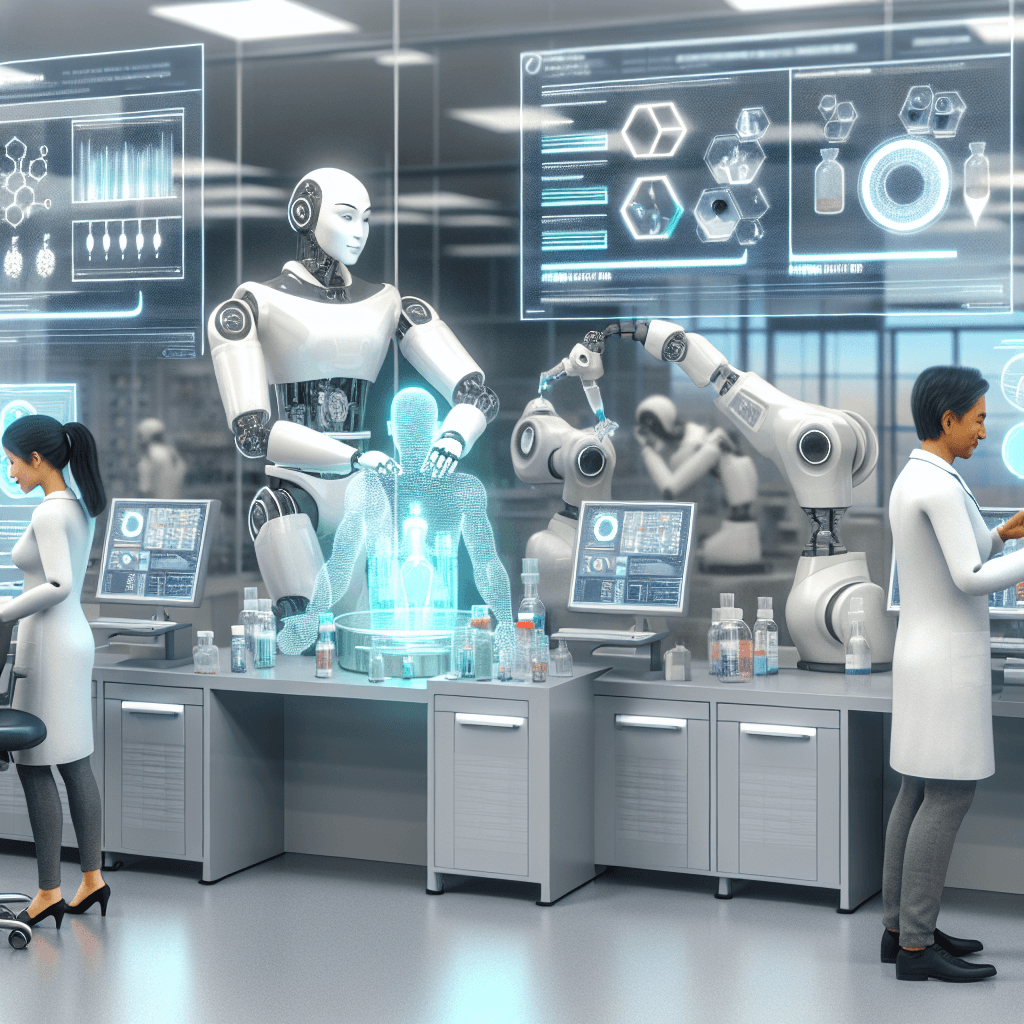Discover how AI is revolutionizing the development of consumer healthcare goods, from personalized treatments to efficient supply chain management.
The Role of AI in Consumer Healthcare Goods Development

Table of Contents
- Introduction
- The Impact of AI on Personalized Medicine in Consumer Healthcare Goods
- How AI is Revolutionizing the Development of Medical Devices for Consumers
- The Role of AI in Improving Accessibility and Affordability of Consumer Healthcare Goods
- Ethical Considerations in Using AI for Consumer Healthcare Goods Development
- Q&A
- Conclusion
“Revolutionizing healthcare through the power of AI – creating smarter, more personalized consumer goods for a healthier future.”
Introduction
Artificial intelligence (AI) has become an increasingly important tool in the development of consumer healthcare goods. With its ability to analyze vast amounts of data and make predictions, AI has the potential to revolutionize the way healthcare products are created, tested, and marketed. In this rapidly evolving field, AI is being used to improve the accuracy and efficiency of product development, as well as to enhance the overall consumer experience. In this introduction, we will explore the role of AI in consumer healthcare goods development and the impact it is having on the industry.
The Impact of AI on Personalized Medicine in Consumer Healthcare Goods
The field of consumer healthcare goods has seen a significant transformation in recent years, thanks to the advancements in artificial intelligence (AI) technology. AI has revolutionized the way healthcare goods are developed, particularly in the area of personalized medicine. This article will explore the impact of AI on personalized medicine in consumer healthcare goods and how it is shaping the future of healthcare.
Personalized medicine, also known as precision medicine, is an approach to healthcare that takes into account an individual’s genetic makeup, lifestyle, and environment to tailor treatment plans. This approach has gained popularity in recent years as it offers more effective and targeted treatments for various diseases and conditions. However, the development of personalized medicine requires a vast amount of data and complex analysis, which can be time-consuming and costly. This is where AI comes in.
AI has the ability to process and analyze vast amounts of data at a much faster rate than humans. This makes it an invaluable tool in the development of personalized medicine in consumer healthcare goods. With AI, researchers can analyze genetic data, medical records, and lifestyle information to identify patterns and make predictions about an individual’s health. This allows for the development of personalized treatments and interventions that are tailored to the specific needs of each patient.
One of the most significant impacts of AI on personalized medicine in consumer healthcare goods is the development of predictive models. These models use machine learning algorithms to analyze data and identify patterns that can predict an individual’s risk of developing certain diseases or conditions. For example, AI can analyze a person’s genetic data and lifestyle factors to predict their risk of developing heart disease or diabetes. This information can then be used to develop personalized prevention strategies and treatment plans.
AI is also playing a crucial role in drug development for personalized medicine. Traditional drug development processes can take years and cost millions of dollars. With AI, researchers can analyze vast amounts of data to identify potential drug targets and predict the effectiveness of a drug in a specific patient population. This not only speeds up the drug development process but also reduces the risk of failure, ultimately leading to more effective treatments for patients.
In addition to drug development, AI is also being used to develop medical devices and wearables for personalized medicine. These devices can collect real-time data on an individual’s health, such as heart rate, blood pressure, and glucose levels. AI algorithms can then analyze this data to identify any abnormalities or patterns that may indicate a potential health issue. This allows for early detection and intervention, leading to better health outcomes for patients.
Another significant impact of AI on personalized medicine in consumer healthcare goods is the development of virtual assistants and chatbots. These AI-powered tools can interact with patients and collect data on their symptoms, medical history, and lifestyle. This information can then be used to provide personalized health recommendations and even assist with diagnosis. Virtual assistants and chatbots are also being used to monitor patients’ health remotely, reducing the need for in-person visits and improving access to healthcare.
However, with all the benefits that AI brings to personalized medicine in consumer healthcare goods, there are also concerns about privacy and ethical issues. The use of personal data in AI algorithms raises questions about data protection and patient consent. There are also concerns about the potential for AI to perpetuate existing biases in healthcare, leading to unequal access to personalized treatments.
In conclusion, AI has had a significant impact on personalized medicine in consumer healthcare goods. It has revolutionized the way healthcare goods are developed, making them more effective, targeted, and accessible. With continued advancements in AI technology, the future of personalized medicine looks promising, and it is undoubtedly shaping the future of healthcare. However, it is essential to address the ethical and privacy concerns to ensure that AI is used responsibly and for the benefit of all patients.
How AI is Revolutionizing the Development of Medical Devices for Consumers

The healthcare industry has been rapidly evolving with the advancement of technology. One of the most significant developments in recent years has been the integration of artificial intelligence (AI) in the development of medical devices for consumers. AI has revolutionized the way healthcare goods are developed, making them more efficient, accurate, and accessible to the general public.
AI is a branch of computer science that focuses on creating intelligent machines that can perform tasks that typically require human intelligence. In the healthcare industry, AI is being used to develop medical devices that can assist in diagnosis, treatment, and monitoring of various health conditions. These devices are designed to be user-friendly, cost-effective, and easily accessible to consumers.
One of the primary benefits of using AI in the development of medical devices is its ability to analyze vast amounts of data quickly and accurately. This data can include patient information, medical records, and research studies. By analyzing this data, AI can identify patterns and trends that can help in the diagnosis and treatment of various health conditions. This not only saves time but also improves the accuracy of diagnosis, leading to better treatment outcomes for patients.
Moreover, AI has the potential to improve the efficiency of medical devices. Traditional medical devices often require manual input and adjustments, which can be time-consuming and prone to human error. With AI, these devices can be programmed to perform tasks automatically, reducing the need for human intervention. This not only saves time but also reduces the risk of errors, making the devices more reliable and accurate.
Another significant advantage of using AI in the development of medical devices is its ability to personalize healthcare. AI can analyze individual patient data and provide personalized recommendations and treatment plans. This is especially beneficial for chronic conditions where treatment needs to be tailored to each patient’s specific needs. With AI, medical devices can be programmed to monitor a patient’s health continuously and provide real-time feedback and recommendations, improving the overall quality of care.
Furthermore, AI has the potential to make healthcare goods more accessible to consumers. With the rise of telemedicine and remote patient monitoring, AI-powered medical devices can be used to provide healthcare services to individuals in remote or underserved areas. This not only improves access to healthcare but also reduces the burden on healthcare systems, especially in times of crisis.
However, the integration of AI in the development of medical devices also raises concerns about data privacy and security. With the vast amount of personal data being collected and analyzed, there is a risk of this information being misused or falling into the wrong hands. To address these concerns, strict regulations and protocols must be in place to ensure the protection of patient data.
In conclusion, AI has revolutionized the development of medical devices for consumers. Its ability to analyze vast amounts of data, improve efficiency, personalize healthcare, and increase accessibility has transformed the healthcare industry. However, it is essential to address concerns about data privacy and security to ensure the responsible use of AI in healthcare. With continued advancements in technology, the role of AI in the development of consumer healthcare goods is only expected to grow, leading to better health outcomes for individuals worldwide.
The Role of AI in Improving Accessibility and Affordability of Consumer Healthcare Goods
The healthcare industry has seen a significant shift in recent years with the integration of artificial intelligence (AI) technology. AI has revolutionized the way healthcare goods are developed, making them more accessible and affordable for consumers. This has been a game-changer for the industry, as it has allowed for the development of innovative products that cater to the specific needs of consumers.
One of the main ways AI has improved accessibility and affordability of consumer healthcare goods is through its ability to analyze vast amounts of data. With the help of AI, companies can gather and analyze data from various sources, such as patient records, clinical trials, and consumer feedback. This data can then be used to identify patterns and trends, which can inform the development of new healthcare goods.
Moreover, AI has also played a crucial role in streamlining the research and development process. Traditionally, developing a new healthcare product would take years of research and testing, making it a costly and time-consuming process. However, with the use of AI, this process has been significantly shortened. AI algorithms can quickly analyze data and identify potential drug candidates, reducing the time and cost of developing new products.
In addition to speeding up the development process, AI has also made it more cost-effective. By automating certain tasks, AI has reduced the need for human labor, which can be a significant expense in the development of healthcare goods. This cost-saving has allowed companies to invest more in research and development, ultimately leading to the creation of more affordable products for consumers.
Another way AI has improved accessibility and affordability of consumer healthcare goods is through its ability to personalize treatments. With the help of AI, companies can analyze a patient’s medical history, lifestyle, and genetic makeup to develop personalized treatment plans. This not only improves the effectiveness of the treatment but also reduces the risk of adverse reactions. Personalized treatments also mean that patients do not have to go through a trial-and-error process, which can be time-consuming and expensive.
Moreover, AI has also made it possible to develop virtual healthcare assistants, which can provide patients with personalized care and support. These assistants can monitor a patient’s health, remind them to take their medication, and even provide them with medical advice. This has not only improved accessibility to healthcare but has also reduced the need for frequent doctor visits, making it more affordable for patients.
Furthermore, AI has also played a significant role in improving the accessibility and affordability of medical devices. With the help of AI, medical devices can now be designed to be more user-friendly and cost-effective. For example, AI-powered glucose monitors can now be used by patients at home, eliminating the need for frequent visits to the doctor. This has not only made it more convenient for patients but has also reduced the cost of managing chronic conditions.
In conclusion, AI has had a significant impact on the development of consumer healthcare goods, making them more accessible and affordable for consumers. By analyzing vast amounts of data, streamlining the research and development process, and personalizing treatments, AI has revolutionized the healthcare industry. With the continued advancements in AI technology, we can expect to see even more innovative and affordable healthcare goods in the future, ultimately improving the overall health and well-being of consumers.
Ethical Considerations in Using AI for Consumer Healthcare Goods Development
The use of artificial intelligence (AI) in the development of consumer healthcare goods has been gaining traction in recent years. With the advancements in technology, AI has become an integral part of various industries, including healthcare. However, as with any new technology, there are ethical considerations that need to be addressed when using AI in the development of consumer healthcare goods.
One of the main ethical concerns surrounding the use of AI in healthcare is the potential for bias. AI algorithms are trained using data sets, and if these data sets are biased, the AI will also be biased. This can lead to unequal treatment of certain groups of people, especially those from marginalized communities. For example, if an AI algorithm is trained using data from a predominantly white population, it may not accurately diagnose or treat health conditions in people of color. This can have serious consequences for the health and well-being of these individuals.
To address this issue, it is crucial for developers to ensure that the data sets used to train AI algorithms are diverse and representative of the population. This means including data from different ethnicities, genders, and socioeconomic backgrounds. Additionally, regular audits should be conducted to identify and eliminate any biases in the algorithms.
Another ethical consideration is the potential for AI to replace human healthcare professionals. While AI can perform certain tasks with greater speed and accuracy, it cannot replace the empathy and human connection that is essential in healthcare. It is important for developers to remember that AI should be used as a tool to assist healthcare professionals, not replace them. This means that AI should be designed to work alongside healthcare professionals, providing them with valuable insights and support in their decision-making process.
Moreover, there is a concern that the use of AI in healthcare may lead to a loss of privacy for patients. AI algorithms require a vast amount of data to function effectively, and this data often includes sensitive personal information. There is a risk that this data could be misused or accessed by unauthorized parties, compromising the privacy of patients. To address this, developers must ensure that strict security measures are in place to protect patient data. Additionally, patients should be fully informed about the use of AI in their healthcare and have the option to opt-out if they are uncomfortable with their data being used.
In addition to these ethical considerations, there is also the issue of transparency. AI algorithms can be complex and difficult to understand, making it challenging for patients and healthcare professionals to trust their decisions. It is crucial for developers to be transparent about how their AI algorithms work and the data they use. This will help build trust and ensure that patients and healthcare professionals are comfortable with the use of AI in healthcare.
Furthermore, there is a concern that the use of AI in healthcare may widen the gap between those who can afford it and those who cannot. AI technology can be expensive, and if it is only available to those who can afford it, it may lead to unequal access to healthcare. To address this, developers must consider the cost implications of their AI technology and work towards making it accessible to all.
In conclusion, while the use of AI in the development of consumer healthcare goods has the potential to revolutionize the industry, it is crucial to address the ethical considerations surrounding its use. Developers must ensure that their AI algorithms are free from bias, work alongside healthcare professionals, protect patient privacy, and are transparent and accessible to all. By addressing these ethical concerns, we can harness the power of AI to improve healthcare outcomes for all individuals.
Q&A
1. What is the role of AI in consumer healthcare goods development?
AI plays a crucial role in consumer healthcare goods development by providing advanced technology and data-driven insights. It can help in identifying consumer needs and preferences, predicting market trends, and improving product design and development processes.
2. How does AI help in improving the quality of consumer healthcare goods?
AI can analyze vast amounts of data to identify patterns and trends, which can help in improving the quality of consumer healthcare goods. It can also assist in identifying potential risks and side effects, leading to safer and more effective products.
3. Can AI be used to personalize consumer healthcare goods?
Yes, AI can be used to personalize consumer healthcare goods by analyzing individual health data and providing tailored recommendations. This can lead to more effective treatments and better outcomes for consumers.
4. What are some potential challenges of using AI in consumer healthcare goods development?
Some potential challenges of using AI in consumer healthcare goods development include data privacy concerns, ethical considerations, and the need for continuous monitoring and updates to ensure accuracy and effectiveness. Additionally, there may be resistance from consumers who are skeptical of relying on AI for their healthcare needs.
Conclusion
In conclusion, the role of AI in consumer healthcare goods development is becoming increasingly important. With the ability to analyze vast amounts of data and provide personalized recommendations, AI is revolutionizing the way healthcare products are developed and marketed. It has the potential to improve the effectiveness and accessibility of healthcare goods, leading to better health outcomes for consumers. However, it is important for companies to ensure ethical and responsible use of AI in order to maintain consumer trust and confidence. As technology continues to advance, the role of AI in consumer healthcare goods development will only continue to grow and shape the future of the industry.








